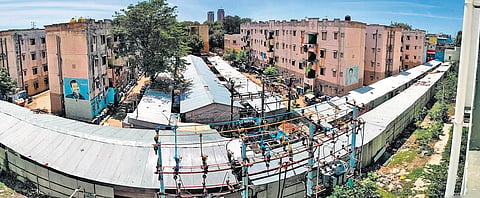

CHENNAI: When evicted residents of Arumbakkam arrive at the apartments in KP Park for resettlement, more than the buildings and basic amenities in place, what catches their attention are the tin sheds that house over 100 families on the same premises. These families had to give up their houses for the apartment construction, and with their newly allotted houses lacking lift or water connections, they have been languishing in the tiny tin sheds.
Not for official laxity, but for being unable to shell out Rs 1.5 lakh each, these families are not provided lift or water facilities. The families, who claim to be native residents of Pulianthope, say they would never be able to afford this amount.
In 2008, they had given up their in situ apartments constructed by the Tamil Nadu Slum Clearance Board (TNSCB), since the officials found the tenements to be dilapidated. The families were promised houses in the sleek apartments that would be raised in the place of the old buildings. According to the Government Order 28, issued in October 2020 by the Housing and Urban Development Department, the beneficiary contribution for in situ houses was fixed at Rs 1.5 lakh, which the residents say they were not informed when their houses were demolished.
Following the demolition, the families resided in makeshift houses on the premises, but those too, got razed about three years ago. Since then, the tiny tin sheds have been their homes. Some families, however, decided to take matters into their own hands. They shifted to the new tenements allotted to them and make do by taking water in pots, up to even the ninth floor.
“We were allotted new houses, but officials said that we can shift there only after paying Rs 1.5 lakh. We would never be able to save that much in our whole lives. But, how long can we continue to live in these sheds. During rains and storms, our children are terrified,” said D Mohanraj, who works as supervisor at a local store. “So, last month, we moved into the new house but the officials cut off water supply and the lift connection. We are the native residents of this place. Our ancestors lived on this land. How can they do this to us?” he asked.
Every morning, dozens of residents get pots of water from the public tap a few metres away from their houses- in bikes, cycles, ‘meen body’ carts or wheel barrows. It is never enough. “Without lifts, we have to carry the water to our houses which are on the seventh or eighth floor,” said Augustina, a housewife.
Several, like 74-year-old Venkatesan, are yet to see their new house since the lift is not operational, and spend their days and nights on the concrete floor outside, since they are too old to use the stairs. “The tin sheds are cramped and we use it to wash clothes, and I cannot go up to our new house on the seventh floor so I spend my day sleeping on the parking space floor,” Venkatesan said.
The demolition and the series of unfortunate events it triggered, have also led to simmering tensions among residents. Residents who were recently evicted from Arumbakkam for the Cooum River eco restoration project, have been allotted houses with electricity, water and lift facilities. For these families, the beneficiary component will be covered by the Chennai Rivers Restoration Trust (CRRT).
“We have been waiting here for several years and we have not received decent houses. But those who were relocated here are provided free houses with lift connection and water supply,” said Selvi P, a resident. A recent analysis by IRCDUC, a community-centric hub for deprived urban communities, stated that the inadequate living conditions in these transit houses had forced residents to take loans from financial institutions so as to access houses with all facilities.
‘Trying to help them’
When contacted, a senior Slum Clearance Board official said that the total cost per tenement was Rs 13 lakh, of which the State grant is Rs 11.5 lakh and the beneficiary has to pay the remaining Rs 1.5 lakh. “We are also trying to explore convergence with other departments to help them,” the official said.